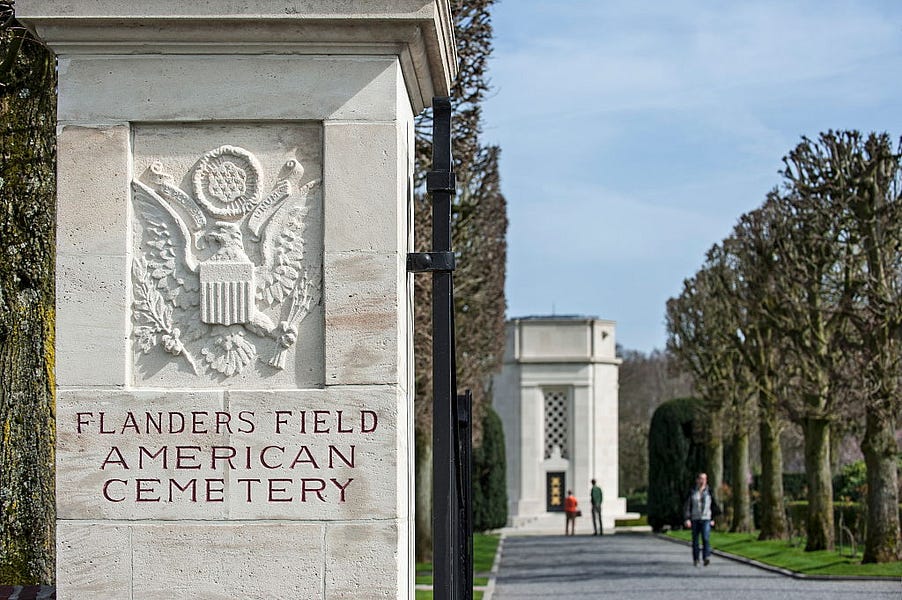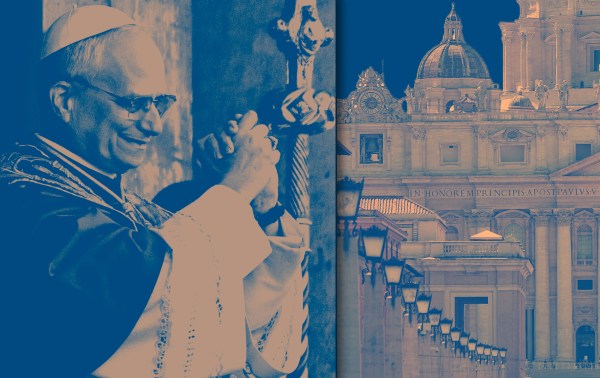You could think of World War I as the last of 1,200 years of conflicts between the rival royal houses of Europe. Or you could think of it as the first war of the American era of world history. But if you’re like most of us, you usually don’t think of it at all.
The “war to end all wars” saw its memory overwritten by the carnage that began two decades later and would surpass the horrors of 1914-1918. World War II more than tripled the 15 million or so lives lost in the first conflict. But there’s another reason World War I so easily slipped from our collective memory. The animating idea behind America’s entry into the war and that guided – or misguided – our efforts to secure a lasting peace have fallen far out of favor.
Woodrow Wilson, the first Democratic president of the 20th century, pushed America into the war to fulfill the vision of the first Democratic president of them all, Thomas Jefferson. Like his fellow Virginian, Wilson dreamed of America using its might to, as he put it, be “champions of the rights of mankind.” This tenet of Democratic doctrine was strengthened by the success of World War II, but destroyed by the Vietnam War. What Jefferson dreamed and Wilson implemented, Lyndon Johnson would discredit.
Many Republicans opposed Wilson’s efforts to enter the war and successfully scuttled the League of Nations, his intended instrument for bringing his progressive vision to the world. When Dwight Eisenhower and Richard Nixon each ran on the promise of ending wars begun by their Democratic predecessors, they were returning to their party’s roots. Both Presidents Bush tried Wilson’s approach in the Middle East, but their party soon rejected it. By the 2017 centennial of America’s entry in World War I, both major parties were staunchly opposed to the idea that Americans should fight so the world could be “made safe for democracy.”
But opposition to Wilson’s war was hardly just a right-wing affair. Republicans were split on the issue, with the party’s German-American base opposed and progressives still pining for the “big stick” interventionism of Teddy Roosevelt in favor. Germans everywhere were treated as suspect. In fact, the war frenzy helped fuel the push for Prohibition since German and Irish immigrants were identified both with supporting neutrality and drinking beer. The most intense opposition to the war, though, came from the far left. The men and women arrested for speaking out against Wilson’s war tended to be socialists, anarchists, and communists. More than 2,000 Americans were jailed under the rankly unconstitutional laws limiting free expression.
The war divided the country, drew out the worst impulses among our leaders, and stoked cultural resentments and bigotry. The attack on Pearl Harbor obliterated meaningful domestic opposition to World War II, but Americans came gradually to the war effort in 1917; sometimes grudgingly, sometimes not at all.
We don’t know what Fred Stockham thought about the war. Did he have some sympathies for the neutrality cause because of Sophie Heinz, the German-American woman who raised him after his mother died and his father abandoned him? Did he back Republican Charles Evans Hughes over Wilson in 1916 like the majority of voters in Essex County, N.J., where he grew up? Maybe one of the two socialists running that year? We don’t know how Stockham felt about American exceptionalism. We don’t know how he felt about any of the swirling political, cultural strife that had consumed his country in the three years between the start of the European war and America’s entry. Lost to history is the state of mind of Gunnery Sgt. Stockham when he arrived in France in the winter of 1918.
Not lost, however, are the details of his actions on June 14 at the Battle of Belleau Wood. Those were recorded in his Congressional Medal of Honor citation: “During an intense enemy bombardment with high explosive and gas shells which wounded or killed many members of the company, … Stockham, upon noticing that the gas mask of a wounded comrade was shot away, without hesitation, removed his own gas mask and insisted upon giving it to the wounded man, well knowing that the effects of the gas would be fatal to himself. He continued with undaunted courage and valor to direct and assist in the evacuation of the wounded, until he himself collapsed from the effects of gas, dying as a result thereof a few days later.”
Like the nearly 2,000 other Americans killed in the horrific fighting at Belleau Wood near the Belgian border, Stockham helped make the U.S. Marines the most feared fighting force in the world. Legend has it that the Marines fought so ferociously that the Germans called them “devil dogs.” It was also where Marine Capt. Lloyd Williams replied to a French colonel’s order to turn back to Paris thusly: “Retreat, Hell! We just got here.” It didn’t matter what Williams or Stockham thought about Wilsonian interventionism. It mattered that they were willing to lay down their lives for their comrades and their mission. That’s the way that it works in a nation with a civilian-controlled military. The people who must willingly go to their deaths must also honor the decisions of flawed leaders in an imperfect system.
Stockham’s grave, like those of hundreds of thousands of our war dead, will be decorated today for Memorial Day. But we have to remember that those flowers are not just to honor them, but to remind us civilians of our duty. We must strive to be worthy of their sacrifices – most of all in the political system that will decide where the heroes of the next generation will be asked to give what Abraham Lincoln called “the last full measure of devotion.” And we must remember that every lie told by a leader, every incitement of hatred for political gain, and every desperate grasp at power for its own sake desecrates the same monuments that will be garlanded today.







Please note that we at The Dispatch hold ourselves, our work, and our commenters to a higher standard than other places on the internet. We welcome comments that foster genuine debate or discussion—including comments critical of us or our work—but responses that include ad hominem attacks on fellow Dispatch members or are intended to stoke fear and anger may be moderated.
With your membership, you only have the ability to comment on The Morning Dispatch articles. Consider upgrading to join the conversation everywhere.